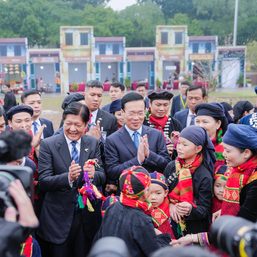SUMMARY
This is AI generated summarization, which may have errors. For context, always refer to the full article.
![[OPINION] Filipinos, is it time to retire ‘Miss Saigon’?](https://www.rappler.com/tachyon/2024/05/tl-retire-miss-saigon-05042024-2.jpg)
Filipinos generally celebrate Miss Saigon since it premiered and starred Lea Salonga as Kim, a 17-year-old Vietnamese prostitute who falls in love with a customer, an American GI. Many Filipino artists have been cast in the musical since then. The appearance of Filipino talent in Miss Saigon crafted an image of the Filipino as a creative, not a “maid in London,” as the group Smokey Mountain lamented in the early ’90s.
Salonga’s casting as Kim descended on the Philippines like a helicopter carrying needed aid – this time in the form of boosting Filipino sense of self-worth. The Filipino pride attached to Miss Saigon has become so ingrained in our minds that it has arguably become a model for what Filipino artistry and global representation should look like.
While Filipinos cultivated pride in the musical, criticism about Miss Saigon grew. Critics called it out for its use of yellowface and gibberish in its lyrics, for romanticizing prostitution and colonialism, for stereotyping of Asians, and for perpetuating myths of white benevolence.
The Vietnamese are among the staunchest critics of Miss Saigon. “I hate Miss Saigon,” said playwright and son of refugees Qui Nguyen. Vietnamese American writer Diep Tran said, upon watching the musical in 2017, “I left with a headache, the kind of headache you get when you are forced to keep your emotions silent.”
Vietnamese protesters and their supporters continue to appeal for the show to stop circulating lies. Through the Don’t Buy Miss Saigon: Our Truth Project, generations of Vietnamese raise awareness about the musical as “a big-budget ode to colonialism that romanticizes war and human trafficking.” Vietnamese actors have also resisted participating in this production that they find harmful, and co-create alternatives, such as the show Vietgone, which is loudly and proudly, “anti-Miss Saigon.”
As Miss Saigon tours globally trailed by protests and testimonies by Vietnam War victims and their descendants, Filipino actors and audiences continue to turn a cold shoulder to the rage of our Vietnamese neighbors even if, in fact, we share similar histories borne out of wars that we did not ask for. Filipinos share many experiences with the fictional lives portrayed in Miss Saigon: the never-ending hunt and fear of communists to protect Western capitalist interests (and the interests of its allies, the local elites) in Asia, women’s search for livelihood in the big city, and failed promises made by American GIs to women, among others.
Vietnam has not hosted the musical
Dennis, now a theater director in Canada and professor of theater, was admittedly a big fan of the musical in the past. He was a serious Miss Saigon enthusiast whose collection included double cassette tapes of the Miss Saigon repertoire, a CD and DVD of The Making of Miss Saigon, and a glossy coffee table book titled The Story of Miss Saigon by Edward Behr and Mark Steyn. Like many Filipinos who grew up hearing about the musical, Dennis and Dada waited for the once-in-a-lifetime opportunity to watch Miss Saigon.
In December 2000, Dennis went to see the musical at the Cultural Center of the Philippines. Dada was a visiting scholar in the UK when she saw the musical in London in 2014. Dennis remembered the musical for its spectacle, but he also left the theater wondering why so many Filipinos revered Miss Saigon’s narrative featuring a teenage girl’s prostitution, and then death by suicide. Dada observed that Filipinos made up a significant portion of the audience in London, the musical appearing to serve as a unifying force for Filipinos coming from different backgrounds who came to show their support for the Filipino cast.
While the Philippines has hosted Miss Saigon twice, Vietnam has not, and will most likely never do so, especially as the country centers the importance of remembering the damages of imperialist intervention, as reflected, for example, in its creation of institutions such as the War Remnants Museum. In this museum, Vietnam boldly displays documentation of American war crimes and warfare tactics, including the use of Agent Orange, a toxic herbicide that affects Vietnamese people and their environment until today.
The musical has become part of the global ideological apparatus that manipulates our perception of the violence wrought by foreign intervention. We see Filipino appreciation of Miss Saigon as connected to the endurance of the myth and stubbornness of American benevolence in the Philippines which manifests in many facets of everyday life, from musicals to problematic monuments which need to be unsettled.
The harm of fantasy
Watching the musical in person, Dennis realized that night that the musical he had loved all throughout his youth had failed him. His once steadfast admiration for the musical spiraled into a sense of heavy-heartedness, because the heroine that he adored, he realized, did not possess political agency. By ending her life, the narrative perpetuated the myth of the American Dream that needs to be aspired for at any cost. Leaving the theater in London, Dada wondered if other Filipinos in the crowd felt the same tug of the discomfort in witnessing a shared racialization – something that Dorinne Kondo would later call “affective violence.”
Pulitzer Prize-winning author Viet Thanh Nguyen’s “Close the Curtain on ‘Miss Saigon’” is an important reading for Filipinos, especially now that the mega musical is on stage in Manila for the second time. Nguyen points out that the enjoyment of Miss Saigon is “based on the privilege that the audience feels, the privilege of not being that Asian woman who kills herself, the privilege of seeing the world from the viewpoint of the powerful white male savior who can both be so attractive that a woman would kill herself over him and be so paternal that he can adopt the mixed-race child who will stand in for childlike Asia, in need of Western benevolent guidance.”
We recognize Nguyen’s mention in his piece that demanding to cancel Miss Saigon will not solve the long-standing problem of racial inequity in the media and other popular forms. In 2023, the University of Southern California’s Annenberg Inclusion Initiative reported that speaking roles for Asians rose from 3.4% to 15.9% in Hollywood in the last 16 years. However, the spread of anti-Asian hate during COVID-19 clearly showed the need for a more just and more diverse representation of Asians and Asian Americans beyond the stereotypical roles assigned to Asian characters in the popular media.
Filipino participation in Miss Saigon reflects enduring issues of Asian orientalism in theater, film, and other avenues of expression, but the difference is that Filipinos appear to be willing participants in this orientalism. At the heart of Filipinos being cast in the main roles of Miss Saigon is the racist idea of Asian interchangeability – that Asians look alike.
Filipinos have to take our supposed interchangeability with our fellow Asians seriously. Historian Simeon Man discusses in his book Soldiering Empire how, during war games to prepare the US Army for the war in Vietnam, Asian (mostly Filipino) and Native Hawaiian GIs played the role of “Viet Cong” suspects while American soldiers practiced shooting them down. As Man writes, Asian and Native Hawaiian GIs are incorporated into the military (receiving the remuneration and prestige that are accorded to American soldiers) while their bodies – interchangeable because of their shared color – are used as a “target of violence.” In the same way, in the world of theater, Filipinos stand in for the Vietnamese who are the racialized subjects of the musical, while they gain fame and bolster Filipinos’ national pride.
Filipino solidarity with the Vietnamese people is historical as we know from the Philippines (Palawan and Bataan) serving as a refuge for fleeing Vietnamese in the final days and the aftermath of the war. Filipino support for Miss Saigon contributes to the delay in the telling of narratives that the Vietnamese community would be able to claim as representative of the complexity of their experience. With the rest of our Asian neighbors, we need to write our own story, and to stop relying on white men and their institutions who profit from our traumas and tragedies. – Rappler.com
Dennis Gupa is a theater director and an assistant professor at the Department of Theatre and Film, University of Winnipeg. He has a PhD in Applied Theatre from the University of Victoria and MFA (Directing) Theatre from the University of British Columbia.
Dada Docot is a filmmaker and anthropologist of the Philippines and the Filipino diaspora with a PhD in Anthropology from the University of British Columbia. Dada completed her MA in Human Security Studies at the University of Tokyo and her BA in Journalism at the University of the Philippines.
1 comment
How does this make you feel?














Imagine a musical about prostitution in Angeles and Subic engendered by the US bases. And then imagine a Filipina as the lead female role. I would hope that we do not celebrate such a musical, regardless of who the singer is.